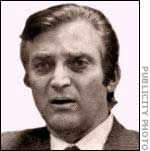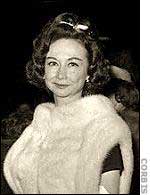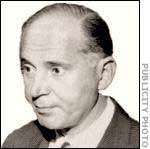The Final Act
By 1963, Lenny Bruce was virtually finished. He had beaten back the obscenity charges in California, but had also been arrested again in that state on drug charges and was ordered to undergo rehabilitation. Being locked down in the rehab ward had prevented Bruce from returning to Chicago, where he had insisted on acting as his own attorney. He was convicted and sentenced to a year in prison. He appealed the decision - he remained free on bail in the meantime - and in July 1964, the Illinois Supreme Court reversed his conviction.
But for every victory, there was a loss.
In April 1963, in the midst of his legal troubles, Bruce made a quick trip to London for a performance. But the British, fearing that Bruce's peculiarly iconoclastic humor might contaminate the national character, refused to let him perform, and took him back to the airport, where he was placed aboard the first plane home.
A few months later, he was arrested after a performance at the Talley Ho in Los Angeles. By that point, the whole routine had become so familiar to him that he reportedly paid his $500 bail and made it back to the club in time for the second show that night. The court ultimately dismissed that charge.
But the most significant arrest was still to come.
Two weeks after his arrest at the Talley Ho, Lenny Bruce was performing at the Café Au Go-Go in New York's Greenwich Village. In the audience that night was a city functionary, who, according to later testimony, was so incensed by what he saw and heard that he notified the Manhattan District Attorney's Office.
The following night, four New York City Vice Squad officers attended the 10 p.m. show at Café Au Go-Go and recorded Bruce's act. In it, the comic performed several of his more famous and provocative routines, including the Loner Ranger bit and his trademark assault on the beatification of Jackie Kennedy.

Richard Kuh, prosecutor
In the eyes of Manhattan District Attorney Richard A. Kuh, it was enough to haul Lenny Bruce into court, along with Howard Solomon, the owner of the club. Three days later, Bruce was again arrested when he appeared on stage at the Café.
It was, by all accounts, a dramatic trial that often seemed even more bizarre and perverse than the nightclub act that had spawned it. The tape of Bruce's supposedly obscene performance was played in its entirety before a three-judge panel. In several instances, high-profile witnesses called to bolster Bruce's argument were subjected to questioning that focused on the most suggestive words and provocative elements of Bruce's act.

Dorothy Kilgallen
Among those who testified for the defense were radio personality and columnist Dorothy Kilgallen, cartoonist Jules Feiffer and author and social critic Nat Hentoff.

Ephraim London, Lenny Bruce's attorney
Each in turn testified that Bruce's act may have been graphic, but was not obscene. It was social commentary.
But the three-judge panel was not convinced.
On November 4, 1964, Lenny Bruce and Howard Solomon were both found guilty by a two-to-one vote of the panel.

Presiding Judge John Murtagh
It was, Collins pointed out, the last time anyone in
America was "tried and convicted for word crimes in a comedy club."
In fact, less than four years later, an appeals court in New York overturned the conviction against Solomon. That ruling, however, did not cover Lenny Bruce. On August 3, 1966, Lenny Bruce had died of a morphine overdose in the bathroom of his home in the Hollywood Hills, a death that was catalogued in one last and lasting obscene image: the lurid, moralizing photograph of the world's sickest comic.

















